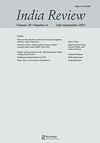US retreat, Indian reform: multilateralism under Trump and Modi
IF 0.6
3区 社会学
Q3 AREA STUDIES
引用次数: 1
Abstract
ABSTRACT From early 2017 to early 2021, Donald J. Trump’s disengagement of the United States from international institutions, later amplified by the pressures of the COVID-19 pandemic, produced a weakening of multilateralism at the global level. The overlapping leadership of Narendra Modi diverged on the issue of multilateralism, producing a dynamic of US retreat and redoubled Indian efforts at reform. Despite their common recourse to populism in their respective countries, the United States and India present disparate cases of how populist leaders engage with multilateralism. Trump prioritized national sovereignty and framed international institutions as an imposition on US freedoms, while Modi envisioned international institutions as an avenue through which to remake multilateralism, elevate India’s reputation, and reap domestic political dividends. Trump’s protectionist and inward-looking policy narratives appealed to communities disadvantaged materially and socially by hyperglobalisation and financial crisis, while Modi’s efforts at elevating India’s profile and engagement in multilateral forums resonated with long-standing elite desires for India to enact leadership in global governance. They drew popular support, too. Finally, China’s rising global influence encouraged India to increase its own influence within existing multilateral institutions and develop new avenues of multilateral action, while Trump’s nationalist response was to turn away, and inward.美国撤退,印度改革:特朗普和莫迪领导下的多边主义
2017年初至2021年初,唐纳德·j·特朗普将美国从国际机构中抽离,随后又因新冠肺炎大流行的压力而放大,导致全球多边主义受到削弱。纳伦德拉•莫迪(Narendra Modi)领导下的领导层在多边主义问题上出现分歧,导致美国退让,印度则加倍努力进行改革。尽管美国和印度在各自的国家都诉诸民粹主义,但在民粹主义领导人如何参与多边主义方面,美国和印度呈现出截然不同的案例。特朗普优先考虑国家主权,并将国际机构视为对美国自由的强加,而莫迪则将国际机构视为重塑多边主义、提升印度声誉和收获国内政治红利的途径。特朗普的保护主义和内向型政策叙事吸引了那些因超级全球化和金融危机而在物质和社会上处于不利地位的群体,而莫迪提升印度形象和参与多边论坛的努力,与长期以来精英们希望印度在全球治理中发挥领导作用的愿望产生了共鸣。他们也得到了民众的支持。最后,中国不断上升的全球影响力鼓励印度在现有多边机构中增加自己的影响力,并发展多边行动的新途径,而特朗普的民族主义反应是转身向内。
本文章由计算机程序翻译,如有差异,请以英文原文为准。
求助全文
约1分钟内获得全文
求助全文

 求助内容:
求助内容: 应助结果提醒方式:
应助结果提醒方式:


